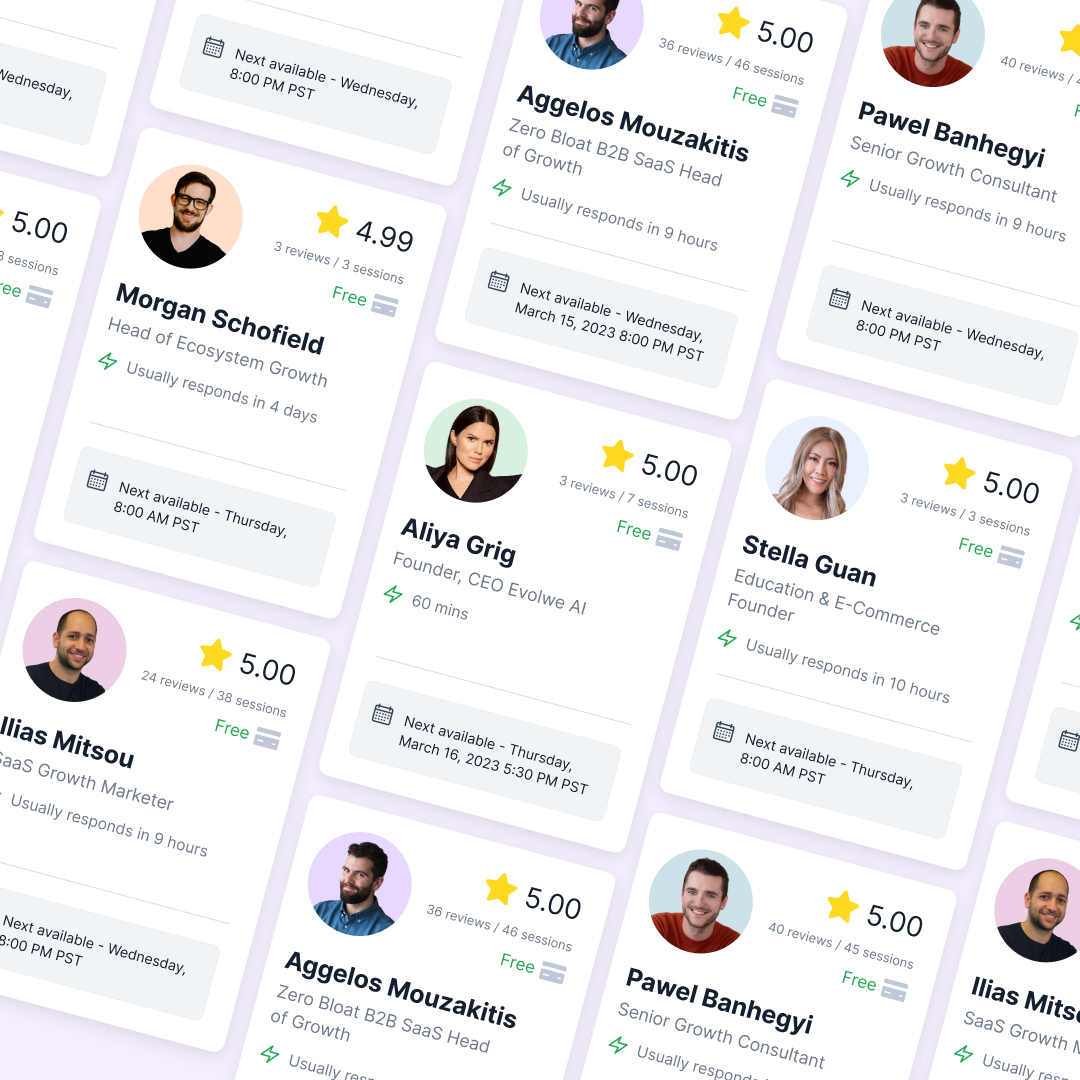How to Use AI Safely in Content Creation
If you’re an SEO or content marketer watching the effects of Google’s March core update, you’re probably wondering if you can use AI in your content creation process or not.
Fortunately, a team of expert SEO and content marketing mentors had the answers for us. Maeva Cifuentes, Aatif Mohd, and Mile Zivkovic joined GrowthMentor LIVE and walked us through exactly how to use AI safely.
Your Featured Mentors

SEO Consultant/Advisor

CEO and Founder of Flying Cat Marketing

SaaS Content Marketing Strategist/Manager/Writer
Understanding how AI really works
To cover our bases, let’s quickly walk through what AI actually does. Aatif explained it super-succinctly for us during the session:
“The core foundation of AI as of today is it’s primarily a predictive engine. And when I say predictive engine, it just tries to understand what comes next after a certain word. And it’s purely based on a bunch of these back training data. So most likely the content or anything that it says is kind of going to be generalized.”
That predictive engine is referred to as an LLM, or large-language model.
Thus, there’s two implications for content generated by a generic AI (custom GPTs are an entirely different beast):
- The AI’s “knowledge base” pulls from content that has already been published on the web
- AI-generated content tends to be generic rather than specific
Why does this matter? It’s because of what Google’s March update says about content.
Is Google penalizing AI-generated content?
First, Google is not penalizing AI-generated content. The update doesn’t call out AI-generated content in any way.
What the update is penalizing, however, is spam and “low value content.”
And while almost every Google update has focused on removing spam, the March update is different, as Maeva pointed out:
“This one is particularly powerful because it’s going to eliminate 40% of the low value, unhelpful kind of content that exists. Another major thing that is different about this core update is that the helpful content update, which used to be its own system separate from Google, only had site-wide signals. So when you were hit by the helpful content update before, it would affect the whole site. This update is integrated within the core ranking algorithm, and it’s actually impacting it at a page level rather than a whole site level. “
Ultimately, this update is trying to prevent abuse of large-scale content operations. Meaning 100% AI-generated programmatic SEO plays, producing content by scraping other sites, or other efforts that would result in a high publishing velocity and minimal quality.
Mile explained it like this:
“All of these websites scaled really quickly and if you go from 10 to 200 articles a month, it’s really not that difficult to notice, especially if it’s a super new website. Going from no production to hyper production like that is a very strong signal that something is wrong. I know some programmatic SEO websites and projects that remained and ranked pretty well. But it’s just that these types of sites that use different tricks to rig the system, to abuse it—those were the ones that got hit.”
There’s another aspect to this puzzle too, which is Google’s information gain scoring. Information gain measures how much net new information an article provides.
Since purely AI-generated content is both A. derivative from existing content and B. generalized, it’s unlikely to provide much in the way of information gain. So it’s another signal of low quality.
Does this mean you have to stop using AI in your content processes immediately? No.
But, you have to do it right.
How to Use AI Safely
Mile probably put it best in our session:
“AI being dangerous is like cars being dangerous. If you put it to the right use, it’s only going to help you.”
We’ll cover what AI should not be used for first. As Maeva pointed out:
“No, AI’s not safe if you say, I’m gonna type in a keyword and then publish what this has generated for me. Because AI is not meant to write the whole blog post for you. That adds no value at all.”
Think of the content creation process. It starts with outlining and research, goes to drafting and editing, and ends with publishing a piece. The further you place AI away from the publication end of the spectrum, the safer you’ll be.
Maeva says to consider the difference as “AI-powered” vs “AI-generated.” Instead of letting the AI generate an entire blog for you, you use it to help you:
- Ideate
- Research, with appropriate fact-checking of course
- Generate small snippets of articles using iterative prompts and significant editing
- Summarize your own original research. like user interviews
- Speed up the tedious, low-value tasks, such as generating tables from large amounts of data
In any case, our mentors all agreed you need to add your own personal context and keep a human touch throughout the process, especially when it comes to editing.
Maeva had a fantastic analogy:
“I see AI like a really eager to please intern who’s brand new and they’ll do whatever you ask. Including making up an article about how to sell a product to a CFO. They write something that’s readable and decent, but doesn’t necessarily make any sense because they don’t know anything. But you might dictate it to them instead.”
Future-Proofing Your Career in the Age of AI
With the safety of AI’s role in content creation clarified, you may start wondering what it means for your career.
Fortunately, the robot overlords aren’t coming for content marketers’ and SEOs’ jobs just yet.
AI is already effective at certain basic SEO tasks (Maeva pointed to what some of SEMrush’s suite of tools can do today).
But AI is almost completely ineffective for:
- Storytelling, especially regarding cause-and-effect linkages
- Complex decision making
- Strategic thinking
- Emotional reasoning
- Tasks that require human connection, like user research
Which means SEOs and content marketers should double-down on their soft skills. Anything requiring a human touch or an excellent grasp of cause-and-effect is fair game.
Aatif said it best:
“As long as you are doing something which is exciting, creative and nuanced, I think that is where you want to position yourself.”
Want even more insights on AI and content creation from Maeva, Mile, and Aatif? Then watch their mentor panel, Surviving Google’s March Core Update, for a knowledge-packed hour.
And if you want personalized advice, become a GrowthMentor pro member and book 1:1 calls with them today!
Done with Chat-GPT's generic advice?


